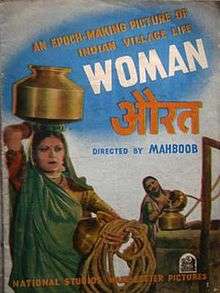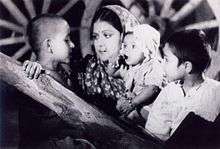Aurat (1940 film)
Aurat, also known by its English title Woman, is a 1940 Indian film directed by Mehboob Khan and starring Sardar Akhtar, Surendra, Yakub, Kanhaiyalal and Arun Kumar Ahuja. The film's music is by Anil Biswas and dialogue is by Wajahat Mirza. Mehboob Khan later remade this film as Mother India (1957),[2] which is considered as one of the biggest hits of all time in Indian Cinema (and again repeated Wajahat Mirza for dialogues, Kanhiyalal as Sukhi Lala and Faredoon Irani for cinematography). The movie was reported to have the shades of Pearl S. Buck's The Good Earth.[3]
| Aurat Woman | |
|---|---|
 Poster | |
| Directed by | Mehboob Khan |
| Written by | Babubhai Mehta Wajahat Mirza |
| Starring | Sardar Akhtar |
| Music by | Anil Biswas |
| Cinematography | Faredoon Irani |
| Edited by | Shamsudin Kadri |
| Distributed by | National Pictures |
Release date |
|
Running time | 154 minutes |
| Country | India |
| Language | Hindustani[1] |
Plot
Radha (Sardar Akhtar) is an indomitable woman, toiling away to feed her three sons and to pay off Sukhilala (Kanhaiyalal), the village's rapacious moneylender. When she learns that she is pregnant again, her husband, Shamu (Arun Kumar Ahuja), runs far away, leaving her to fend for herself against poverty and the lecherous advances of Sukhilala. Later, the two eldest children die, leaving her with only two sons: the strait-laced Ramu (Surendra) and the wild Birju (Yakub). The latter of the two becomes a bandit, who kills Sukhilala and kidnaps his childhood sweetheart. As a result, Radha and Ramu are cast out of the village. Eventually, Radha kills Birju for dishonoring her.
Cast

- Surendra as Ramu
- Sardar Akhtar as Radha
- Yakub as Briju
- Aroon as Shamu
- Harish as Bansi
- Jyoti as Jamna
- Kanhaiyalal as Sukhi
- Vatsala Kumtekar as Kamla
- Sunalini as Sunder Chachi
- Brijrani as Tulsi
- Akbar Gulam Ali as Laloo
- Kanu Pande as Chandoo
- Wasker as Fulchand
- Amirbanu as Kashibai
References
- Aḵẖtar, Jāvīd; Kabir, Nasreen Munni (2002). Talking Films: Conversations on Hindi Cinema with Javed Akhtar. Oxford University Press. p. 49. ISBN 9780195664621.
most of the writers working in this so-called Hindi cinema write in Urdu: Gulzar, or Rajinder Singh Bedi or Inder Raj Anand or Rahi Masoom Raza or Vahajat Mirza, who wrote dialogue for films like Mughal-e-Azam and Gunga Jumna and Mother India. So most dialogue-writers and most song-writers are from the Urdu discipline, even today.
- Gulzar, Govind Nihalani; Chatterjee, Saibal (2003). Encyclopaedia of Hindi Cinema. Popular Prakashan. p. 55. ISBN 81-7991-066-0. Retrieved 21 January 2011.
- https://www.rediff.com/movies/2003/may/19copy.htm